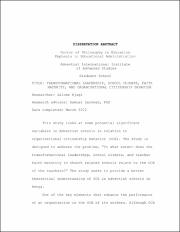Transformational leadership, school climate, faith maturity, and organizational citizenship behavior
Abstract
This study looks at some potential significant variables in Adventist schools in relation to organizational citizenship behavior (OCB). The study is designed to address the problem, ―To what extent does the transformational leadership, school climate, and teacher faith maturity in church related schools relate to the OCB of the teachers?‖ The study seeks to provide a better theoretical understanding of OCB in Adventist schools in Kenya.
One of the key elements that enhance the performance of an organization is the OCB of its workers. Although OCB
is important, little is known about the factors contributing to willingness of teachers going an extra mile in their workplace. The respondents were 170 teachers from Adventist schools in Kenya. The teachers responded to 4 instruments along with demographic variables. These were the Multifactor Leadership Questionnaire, Organizational Climate Index, Thayer Long-Form Faith-Maturity Questionnaire, and Organizational Citizenship Behavior Scale. The majority of teachers in the Central Kenya Conference of the Seventh-day Adventists are married, have no bachelor’s degree, and are males. Teachers with lower than bachelor’s degree education, below 30 years of age, and have been teaching for less than 1 year in the school have a significant positive relationship with school climate scales—professional teacher behavior, collegial leadership, and achievement press, transformational leadership style, and OCB. However, they were not significantly related with faith maturity.
The greatest influence on teachers’ perception of OCB was professional teacher behavior (β= .300), followed by achievement press (β = .272) and faith maturity (β = .210). The findings suggest that professional teacher behavior,
achievement press, and faith maturity are closely related to OCB. The model explained 35.3% of the variance in OCB.


